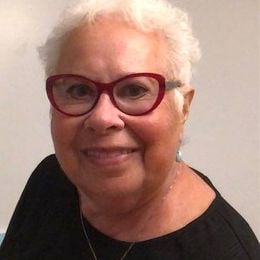'When I Realized I Was Gay, Menopause Arrived.' Was There a Connection?
With menopause comes new physical and emotional symptoms; the main thing I've learned is that it is consistently inconsistent

I was at dinner one winter evening with seven friends. All of us had gone through or were in the midst of going through our menopause. Outdoors, the temperature was a brisk 32 degrees. Yet as I looked around the table in the restaurant, I had to laugh.
Most women begin this journey from menstruation, to perimenopause, and then to menopause in their mid-forties.
Jane wore a tank top and constantly mopped her face. Marie kept her winter jacket on, zipped up to her neck. I wore a heavy sweater. The rest were clothed somewhere in between. Other than Jane, who complained that it was too hot, we were all comfortable — for the moment.
Most women begin this journey from menstruation, to perimenopause, and then to menopause in their mid-forties. With menopause comes new physical and emotional symptoms. Hot flashes or cold chills, mood swings, crankiness, feelings of sadness or anxiety are just some of the changes that might manifest themselves at this time. Trouble concentrating or feelings of fatigue are others.
Menopause and Women's Sex Drive
Stephanie Faubion, medical director of the North American Menopause Society and director of Mayo Clinic Center for Women's Health says, "Some women also experience lower sexual desire, primarily due to the lack of estrogen. There is a shift from a more spontaneous desire pattern to a more responsive sexual desire pattern where [given the] right place, right time, right partner, right situation, the woman is willing to be sexual, but she may not have spontaneous sexual thoughts or fantasies."
While it is natural for some menopausal women to lack sexual drive and it is true that dryness can make sex uncomfortable (although there are remedies for that), some women, like Evelyn, who had not been keen on having sex with her husband for years, and had been faking headaches, said, "Menopause was a good excuse to cease sexual activities completely. I no longer had to fake headaches."
During menopause, it became obvious to some women that they were in stuck places.
Some women, like Margaret, whose stories are included in the book "M-Boldened: Menopause Conversations We All Need to Have," edited by Caroline Harris, saw menopause as a sign that they were no longer a full woman.
Margaret said, "I knew exactly when I had my last period. It was heavier than any period I had ever had. For one split second I felt bad. I could never have another baby. I felt like I had lost the ability to feel like a real woman. I felt as though sexually I was facing an end."
Others, in good relationships, noted an increase in sexual activity as, no longer fearful of unwanted pregnancies, they felt freer to enjoy sex.
During menopause, it became obvious to some women that they were in stuck places. They spoke of the chaos and confusion in their lives at that time: from kids leaving home to older parents needing care, and all had retirement looming ahead. While some took up new hobbies, others felt an overwhelming need to make more drastic changes: returning to school, finding more challenging jobs, leaving their marriages.
While some women found little, or no correlation between their sexual desires and menopause, others who left unsatisfying marriages found more compatible mates. And some ended up having better sex than ever before.
Coming Out and Menopause
Some of the women I interviewed for my book, "Married Women Who Love Women and More," felt there was a definite connection between their coming out and menopause, whether or not they thought they might have been attracted to women earlier. Those who had been married wondered if there had been signs they'd just ignored while busy doing what they were supposed to be doing as wives and mothers. They wondered if they had been playing a role while raising their children.
Maria realized that she was attracted to women when she returned to college. She said, "My husband and I had focused on our careers and raising two kids together. Who had time to think of anything else? Then I took a women's study course and my mind seemed to open up. I fell in love with my professor and realized I wanted to be with women."
For Rebecca, menopause and gayness came about almost simultaneously. "I thought it was menopause that was causing me to feel attracted to women. I think that had a lot to do with me waking up to who I authentically was."
The main thing I've learned about menopause is that it is consistently inconsistent.
Betsy said, "I suppressed my attraction to women for three decades until I decided — after 30 years of marriage, a year and half after the hysterectomy that triggered the start of menopause, that I did not want to do that any longer. After more than a year of therapy, I now have a girlfriend. I hope to preserve my marriage and maintain my relationship with my girlfriend forever. She and my husband have met and like each other but my relationship with each of them is separate. We are navigating our situation better than most."
Weight gain, which frequently happens during menopause, hampered the sexual enjoyment for some because cultural ideals equate being thin with being desirable. Some of the women who identified as lesbian or bisexual, however, seemed to be less concerned with their body images, as they were less affected by heterosexual ideals of what a woman should look like.
Joanna said, "Deep inside I've known and had these feelings my whole life. I crushed on and obsessed about girls, and later about women until I finally broke the closet door down. That said, menopause hasn't diminished (maybe enhanced?) my sex drive. My first relationship with another woman was after I began my menopause at 55."
The main thing I've learned about menopause is that it is consistently inconsistent. Very few women shared identical stories. The luckier ones said, "it was easy," or, "nothing really exceptional." Several said, "My period just stopped."
Women in menopause were once expected to be irritable, tired, depressed or all three and we fed into that ageist culture. Fortunately our beliefs have shifted dramatically. We are now seeing more media coverage of strong, energetic menopausal women. We are looking younger and sexier and are changing our cultural negativity about aging and menopause.

Carren Strock has often been called a Renaissance woman. Equally at home with a paintbrush and canvas, a needle and thread, or a hammer and nails, she is as eclectic in her writing as she is in her other interests. The author of seven books, she is best known for her ground-breaking book Married Women Who Love Women, now in its third edition. Read More

